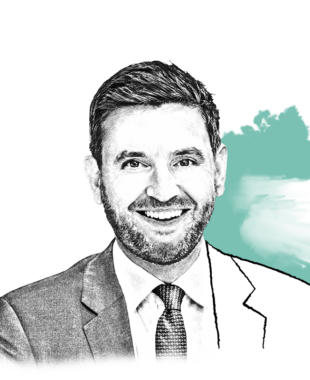In late September investment managers, Lindsay Scott and Jamie Zegleman travelled to Italy to meet with companies across healthcare, industrial, technology and luxury sectors. So often dismissed, economically and financially, this trip was a valuable reminder of a different view, one of corporate success and innovation.
The consensus view on Italy so often rests on tales of inefficiency, inward thinking, and industrial decline. In contrast, based on our highly selective, company-focused approach, we have long found Italy to be home to some world-leading companies with strong competitive positions in particular industry niches, and an equally compelling international vision and appetite for growth. Our conclusions from this most recent trip were no different.
Italy’s proud industrial legacy in 2023
Like many of its European peers, Italy has a long and proud industrial history. That legacy might be most commonly associated with its many automobile marques, but its industrial expertise is also very evident in pharmaceuticals and healthcare and during our travels we met a number of companies with proven track records in delivering technology and processes to support automation, improve efficiency and meet the evolving needs of longstanding customers.
Founded in 1949, Stevanato Group devises systems and processes for its healthcare partners allowing drug delivery that is both safe and easy-to-use. During the trip we were able to visit one of the company’s sites viewing a syringe production facility as well as R&D and engineering centres. For us, there was a valuable read across into the GLP-1 space that has become so high profile, with importance not only to the future growth of Novo Nordisk and Eli Lilly amongst other, but with potentially profound implications for healthcare and highly processed foods and beverages. Through its expertise in precision engineering and track record in innovation across automation and control, Stevanato’s current work around drug containment solutions, drug delivery systems including auto injection and wearables is also very much aligned with areas of growth within this sector, growth underpinned by fundamental demographic and technological trends.
It was a similar story of cutting-edge innovation during our meeting with DiaSorin, a specialist operator in the in-vitro diagnostics (IVD) industry with particular strength in the immunodiagnostics market.
Offer(ing) services above and beyond those available from the big players
Unlike the large IVD players, such as Roche, Abbott, Siemens Healthlineers, DiaSorin’s strategy is more specialised and focused in only a few areas. This has allowed the company to offer services above and beyond those available from the big players which in turn has allowed particularly strong customer ties, adding resilience to the business as well as offering future growth opportunity.
We also met with Amplifon, the global leading hearing aid and hearing service provider and Essilor Luxottica, which holds a similar global-leading position in eyecare. The outlook for both companies is not only underpinned by rising living standards and demographic trends but also innovation that deepens their competitive position and enhances the day-to-day lives of their customers.
Its focus on niches within immunology, oncology and metabolic diseases has proved very successful
Another meeting in this sector was with specialised pharmaceutical and rare disease business Recordati.
With its branded generics providing a cash generating backbone to the company, we talked more about its rare disease business which has grown to a third of sales. Here the company was early to identify the opportunity in this market and its focus on niches within immunology, oncology and metabolic diseases has proved very successful. With acquisitions very much part of the company’s future plans, we also discussed the company’s more recent purchase of two urology products from GSK, to better understand how those assets are incorporated into the business and the strategy that is then put in place to increase the rate of growth.
The Fashion Capital
Luxury is another area that is as synonymous with Milan as it is with Paris and meetings with both Prada and Moncler provided valuable insight into the current marketplace, adding to what we have recently heard from both Hermès and LVMH. At Moncler, we met with the Group’s Chief Corporate & Supply Officer as well as the Chief Brand Officer, a 25-year veteran of Nike amongst other finance and brand roles. They outlined plans for the careful extension of the Moncler offer across all seasons and an accompanying store roll out plan. Both companies spoke about the current renaissance in ‘quiet luxury’ that we have heard from others in this sector, and a trend that we’ve seen negatively impact Kering’s Gucci in particular. China was also, of course, a key topic of conversation with both Moncler and Prada noting that travel by the Chinese consumer and spending in Europe is still limited. Moncler attributed this to lack of flights into Europe, but both were confident that travel, and spending, at pre-Covid 19 levels would resume at some point.
We also learnt more about what might be perceived as luxury gym equipment in a meeting with Technogym. Understandably keen to set themselves apart from Peloton, management were also quick to dispel any myth that they are merely a successful provider of equipment to high-end gyms and hotels.
We learnt more about the company’s widening customer base as well as the increasingly important service element. We heard about the evolution from a focus on electronics in the 1990s to AI today, with data now central to the services that go along with the equipment. In management’s view this moves the company into a healthcare market, rather than a narrow exercise market, with services to address the impact of aging and to support longer and healthier lives. There are also services to support rehabilitation with the company currently working with 12,000 rehabilitation centres.
Family and founders
Another defining characteristic of Italy’s corporate landscape, and many of its success stories, has been the prevalence of family-owned and founder-led companies. In our conversations with both Recordati, and Technogym we were left in no doubt about the positive arguments for ongoing founder and family ownership and involvement in listed companies.
In addition to the benefits of having a strategic long-term shareholder with an enduring (and often multi-generational) commitment to the company, it also enables such companies to invest with a long-term focus. These types of companies are often able to take strategic chances and to pursue growth opportunities that companies entirely beholden to meeting quarterly earnings targets might have to forgo. There is a balance to be struck of course. When considering investments in such businesses, we do also seek commensurate corporate governance practices to minimise risks to minority shareholders. Significant representation from independent directors on the board, for example, helps to ensure that the benefits from long-term founder and family involvement are maximised.
Long-term thinking
That same long-term message came through in a meeting with Intercos, a company that acts as a CDMO (contract development and manufacturing organisation) for the cosmetics industry and where the founder Dario Ferrari retains 32% of the business. Whilst we might more often think of the important, and growing role of CDMOs, like Lonza or Sartorius in pharmaceutical manufacturing, Intercos has an equivalently important place in the supply chain of make-up skincare and hair & body brands. It is one of the few global players supplying all the big brands including L’Oréal. In that context this meeting also provided an interesting look behind the R&D and innovation curtain of the cosmetics industry.
An interesting look behind the R&D and innovation curtain of the cosmetics industry
Reply is another founder-led company, and this was another reassuring meeting. For the first time, we met Ricardo Lodigiani, one of the four original founders, and it was interesting to hear his thoughts on what really differentiates the company.
He highlighted the company’s operating structure, entrepreneurial ethos and approach to remuneration, one which he strongly believes is structured to incentivise staff to invest for profitable long-term growth. We also heard his take on what has underpinned the company’s success, a narrative that was reassuringly consistent with what we have heard from other members of the management team in the past. He was clear that the company’s focus on the most complex, cutting-edge technologies and then helping their customers to adopt and implement those technologies has helped Reply avoid the more commoditised areas of the IT service market and in doing so supported more profitable growth than many others in this industry.
We also met with Dr Aldo Fumagalli Romario, Chairman and Managing Director of SOL who is part of the third generation of one of the founding families. Those founding families own 60% of the company with members of the fourth generation also part of the company today. We heard about the company’s evolution from its establishment in 1927 to its expansion post second world war and through the 1960s, diversifying its supply of technical gases, equipment, services and sectors across industrial sectors. Dr Romario shared his own career progression including a stint working for Praxair in the US but also spoke compellingly about the company’s values that have remained core as it has grown. In outlining the values of harmony, honesty, free circulation of information, vision and a generational approach, we were struck by the ambition but also the straightforwardness of these goals, free of management-jargon and instead centred on what might differentiate the company and maintain the consistency of its success.
We were struck by the ambition but also the straightforwardness of these goals, free of management-jargon
Reporting Back
Research trips form an important part of our overall research process which spans desk-based research, engagement with companies and conversations with industry experts. Dialogue, both exchange of ideas and challenge, within the Research team is another critical part of that process as is reporting back from research trips, sharing both information and impressions.
In reporting back from Italy, the message was one of distinct optimism.
The itineraries for all our research trips are of course planned around meetings with companies that have already met our investment criteria, or have the potential to, and so the content and tone of our conversations with the companies that we met with in Italy cannot be viewed as a proxy for the country’s general corporate mood. However, contrary to the often-downbeat common consensus on Italy, every company we met with outlined an innovative and ambitious strategy for international growth.
At our Research Conference in Edinburgh back in May, former Prime Minister of Italy, Matteo Renzi regretfully observed that so often he is told that Italy might be considered a very good museum, indeed probably one of the best museums in the world; very beautiful but without possibilities for business. In a follow up call with the Research team during the summer, he made the same observation but then made the case for Italy with examples of supportive government policy to attract skilled individuals as well as finance into the country’s corporate sector. Whilst we wouldn’t say that Italy has redressed its PR problem, and those government policies certainly have some way to go, the companies we met with were far from museum relics.
Contrary to the often-downbeat common consensus on Italy, every company we met with outlined an innovative and ambitious strategy
Consistent Role of Founders and Families
Almost all the companies that we met with during this Research trip have some form of family or founder ownership, often spanning several generations. Below some of those companies:
Intercos Group
Founded in 1972 by Dario Ferrari who remains as Executive President and retains a 32% shareholding.
EssilorLuxottica
Luxottica was founded in 1961 by Leonardo del Vecchio, merging with Essilor in 2017. Mr del Vecchio was Chairman of the combined group until his death in 2022, at which stage his 32% shareholding passed to his family.
Stevanato Group
Founded in 1949 by Giovanni Stevanato, his son remains Chairman of the Board Emeritus, with two of his grandsons now Executive Chair and Vice Chair.
Amplifon
Founded in 1950 by Algernon Charles Holland whose family retain a 42% holding.
Recordati
In 1920 Giovanni Recordati set up a laboratory at the back of his family’s pharmacy, establishing a standalone company in 1926. The family has remained very much involved in the company since then with Andrea Recordati currently Chair, having joined the board in 1998 and then been CEO from 2016 to 2021 before assuming his current role.
Moncler Group
Chair and CEO Remo Ruffini has been Chair and CEO of the Moncler Group since 2003 and has a 25% shareholding.
Prada
Founded in 1913 by Mario Prada, with his granddaughter Miuccia Prada an Executive Director today, alongside her husband Patrizio Bertelli as Chair and CEO. Their son, Lorenzo Bertelli is also an Executive Director and CEO designate. The family retain 80% ownership.
Interpump
Founded in 1997 by Fulvio Montipo who remains the CEO and holds around 25% of the company.
Reply
Mario Rizzante the current Chair was one of the four co-founders of Reply back in 1996. His family retain a 40% shareholding with his daughter Tatiana Rizzante the current CEO and his son, Filippo an Executive Director and CTO.
SOL
The current Chairman and Managing Director, Dr Aldo Fumagalli Romario is the third generation of one of the founding families having joined the company in 1984. Representatives from the fourth generation of the founding families also now work in the company at positions currently below board level.
Technogym
Founder Nerio Alessandri built the first Technogym machine in his garage in 1983, founding the company with Pierluigi Alessandri in the same year. Today, Nerio remains Chairman & CEO, and Pierluigi, Vice President. Erica Alessandri also joined the business in 2016 and the family retain a 34% holding.
Stock Examples
The information provided in this article relating to stock examples should not be considered a recommendation to buy or sell any particular security. Any examples discussed are given in the context of the theme being explored.
Important Information
This article is provided for general information only and should not be construed as investment advice or a recommendation. This information does not represent and must not be construed as an offer or a solicitation of an offer to buy or sell securities, commodities and/or any other financial instruments or products. This article may not be used for the purpose of an offer or solicitation in any jurisdiction or in any circumstances in which such an offer or solicitation is unlawful or not authorised.




